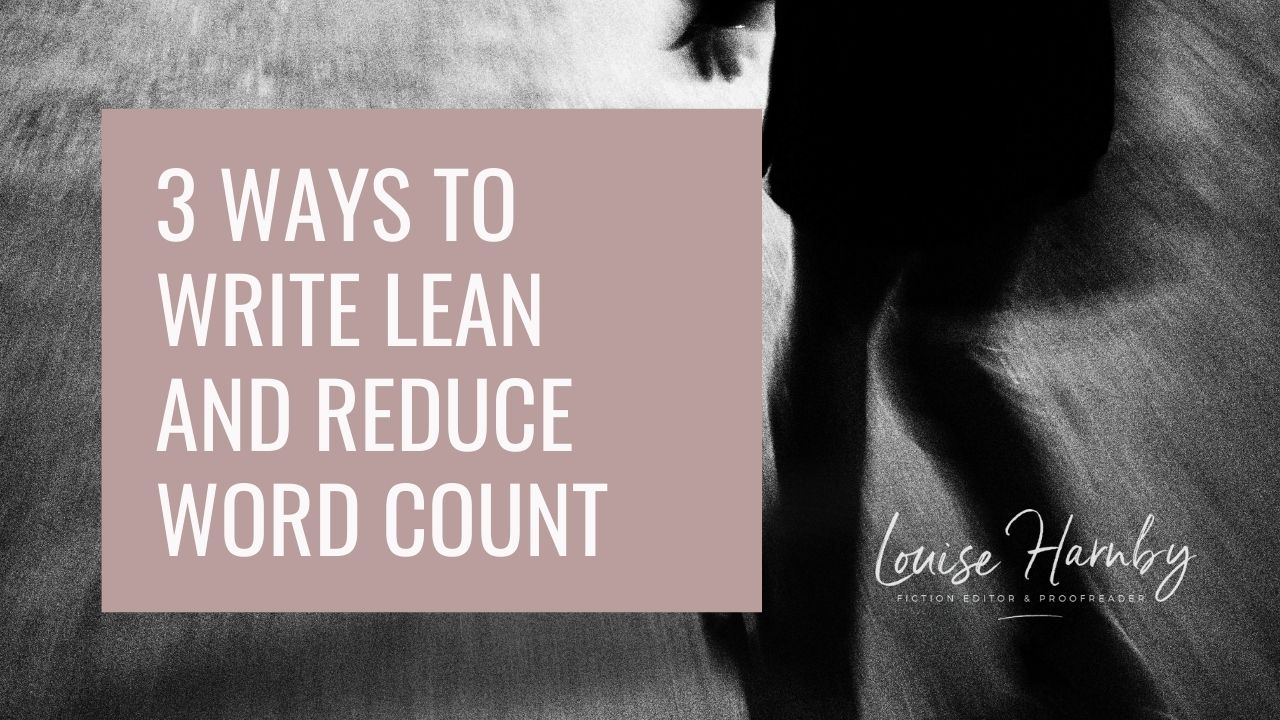|
Here are three clutter checks you can carry out on your novel. Reviewing, and editing where appropriate, will help keep your crime fiction, thriller or mystery writing tight and engaging.
|
|
WITH FILTER
|
FILTER REMOVED
|
|
Danni knew there was a door in the back of the hut that led into the woods. She could make her escape there.
[Reader’s gaze focuses inwards on Danni’s doing the action of knowing.] |
There was a door in the back of the hut that led into the woods. She could make her escape there.
[Reader assumes it’s Danni doing the knowing since she’s the viewpoint character, and focuses outwards on the solution – the door.] |
|
The backdoor – it leads to the woods, Danni thought.
[Reader’s gaze focuses inwards on Danni’s doing the action of thinking.] |
The backdoor – it leads to the woods.
[Reader assumes the thought belongs to Danni, and focuses on the substance of the thought.] The backdoor – it led to the woods. [This alternative uses free indirect style; it frames the thought in the novel’s base tense and narrative style – third-person past.] |
|
He flung open the door and saw the gunman standing over by the window, rifle trained on the street below.
[Reader’s gaze focuses inwards on the man’s doing the action of seeing.] |
He flung open the door.
The gunman stood over by the window, rifle trained on the street below. [Reader assumes it’s the man doing the seeing since he’s the viewpoint character, and focuses outwards on the gunman.] |
Clutter check #2: Review speech tags
Review your dialogue tags and consider the following:
- Is the tag necessary?
- Is the tag taking centre stage?
- Is the tag illogical?
If there are only two characters in a scene, it might be obvious who’s speaking, which gives the author space to introduce reminder nudges only now and then.
|
ALL THE TAGS!
|
REDUCED TAGGING
|
|
‘There’s a door at the back of the hut,’ Danni said.
‘You’re sure it isn’t locked?’ I said. ‘No,’ she said. ‘Trish never locks it. Not since the fire.’ ‘And that’ll get us into the woods?’ I said. ‘Yup. There’s a track. It’s overgrown but I know the way. Used it all the time when I was young and foolish,’ she said. ‘What do you mean was?’ I said. ‘You’re too funny,’ she said, and pulled a face. |
‘There’s a door at the back of the hut,’ Danni said.
‘You’re sure it isn’t locked?’ ‘No. Trish never locks it. Not since the fire.’ ‘And that’ll get us into the woods?’ ‘Yup. There’s a track. It’s overgrown but I know the way. Used it all the time when I was young and foolish.’ ‘What do you mean was?’ I said. Danny pulled a face. ‘You’re too funny.’ |
Showy speech tags scream their presence from the page, and shift the reader’s attention away from the dialogue and onto the tag. They often tell what the dialogue’s already shown, and indicate a lack of trust in the reader to get the speech. Examples include ‘exclaimed’, ‘opined’, ‘commanded’
|
TAG TAKES CENTRE STAGE
|
DIALOGUE TAKES CENTRE STAGE
|
|
‘Watch out!’ Danni warned.
|
‘Watch out!’ Danni said.
|
|
‘Yup. There’s a track. It’s overgrown but I know the way. Used it all the time when I was young and foolish.’
‘What do you mean was?’ I joked. |
‘Yup. There’s a track. It’s overgrown but I know the way. Used it all the time when I was young and foolish.’
‘What do you mean was? |
|
EXPRESSION TAG
|
ACTION BEAT
|
|
‘No,’ Danni grimaced. ‘Trish never locks it. Not since the fire.’
|
‘No.’ Danni grimaced. ‘Trish never locks it. Not since the fire.’
|
|
EXPRESSION TAG
|
SPEECH TAG
|
|
‘Yup. There’s a track. It’s overgrown but I know the way. Used it all the time when I was young and foolish.’
‘What do you mean was?’ I laughed. |
‘Yup. There’s a track. It’s overgrown but I know the way. Used it all the time when I was young and foolish.’
‘What do you mean was?’ I said. |
Clutter check #3: Review action beats
They key to effective use is ensuring they amplify dialogue rather than interrupt it.
Think about movies. On the screen, all the actors movements and gestures are visible. Replicating this detail in a novel can be invasive and pull the reader away from what’s being unveiled through the speech.
While action beats are superb backdoors into the emotional space of non-viewpoint characters, the dialogue should be where the main action is taking place. If it’s not, what might be required is a reworking of the dialogue, not the introduction of more action beats.
Instead of mimicking the screen experience, use action beats to show what the dialogue doesn’t convey. That needn’t mean including them with every turn. Great dialogue doesn’t need to be anchored every time a character opens their mouth. A purposeful nudge now and then will be enough.
Watch out in particular for prose that’s overloaded with mundane action beats – legs stretching, fingers raking through hair, raised eyebrows, arms folding, fingers steepling.
Review your action beats:
- Do they tell the reader something the dialogue doesn’t or are they mundane details that a reader could imagine?
- Are they infrequent nudges or are they littering the dialogue at every turn of speech?
- Could the mood conveyed by the action beat be conveyed better by improving the dialogue?
Getting rid of the dull and redundant ones will reduce your word count. And what’s left on the page will be more engaging.
|
ACTION BEATS THAT INTERRUPT DIALOGUE
|
ACTION BEATS THAT AMPLIFY DIALOGUE
|
|
Danni pointed at the back of the cellar. ‘Over there. The door. It leads to the woods.’
‘You’re sure it isn’t locked?’ Max rubbed his forehead. ‘Maybe we need a Plan B.’ ‘No.’ Her brow furrowed. ‘Trish never locks it. Not since the fire.’ Max tilted his head. ‘The fire? What happened?’ ‘It was years ago.’ She waved his question away and jabbed a finger towards the door again. ‘Out back there’s a track. It’s overgrown but I know the way. Used it all the time when I was young and foolish.’ ‘What do you mean was?’ he said, and smirked. She pulled a face. ‘You’re too funny.’ |
Danni pointed at the back of the cellar. ‘Over there. The door. It leads to the woods.’
‘You’re sure it isn’t locked?’ Max said. ‘I dunno, maybe we need a Plan B.’ ‘No. Trish never locks it. Not since the fire.’ ‘The fire? What—’ ‘It was years ago. Whatever. Focus. Out back there’s a track. It’s overgrown but I know the way. Used it all the time when I was young and foolish.’ ‘What do you mean was?’ She pulled a face. ‘You’re too funny.’ |
Summing up
However, if they’re mundane or interruptive clutter that can be assumed, leave them out so we can focus on the words that really matter.
Related reading
- 3 reasons to use free indirect speech in your crime fiction
- Author writing resources
- Becoming a Fiction Editor (free booklet for editors)
- Dialogue tags and how to use them in fiction writing
- Editing Fiction at Sentence Level (book for editors and authors)
- Filter words in fiction
- Making Sense of ‘Show, Don’t Tell’ (book for editors and authors)
- Switching to Fiction (course for editors)
- Tips on lean writing
- What are action beats and how can you use them in fiction writing?
She is an Advanced Professional Member of the Chartered Institute of Editing and Proofreading (CIEP), a member of ACES, a Partner Member of The Alliance of Independent Authors (ALLi), and co-hosts The Editing Podcast.
- Get in touch: Louise Harnby | Fiction Editor & Proofreader
- Connect: Twitter at @LouiseHarnby, Facebook and LinkedIn
- Learn: Books and courses
- Discover: Resources for authors and editors
Great information. Thank you.
Leave a Reply.
BLOG ALERTS
TESTIMONIALS
Dare Rogers
'Louise uses her expertise to hone a story until it's razor sharp, while still allowing the author’s voice to remain dominant.'
Jeff Carson
'I wholeheartedly recommend her services ... Just don’t hire her when I need her.'
J B Turner
'Sincere thanks for a beautiful and elegant piece of work. First class.'
Ayshe Gemedzhy
'What makes her stand out and shine is her ability to immerse herself in your story.'
Salt Publishing
'A million thanks – your mark-up is perfect, as always.'
CATEGORIES
All
Around The World
Audio Books
Author Chat
Author Interviews
Author Platform
Author Resources
Blogging
Book Marketing
Books
Branding
Business Tips
Choosing An Editor
Client Talk
Conscious Language
Core Editorial Skills
Crime Writing
Design And Layout
Dialogue
Editing
Editorial Tips
Editorial Tools
Editors On The Blog
Erotica
Fiction
Fiction Editing
Freelancing
Free Stuff
Getting Noticed
Getting Work
Grammar Links
Guest Writers
Indexing
Indie Authors
Lean Writing
Line Craft
Link Of The Week
Macro Chat
Marketing Tips
Money Talk
Mood And Rhythm
More Macros And Add Ins
Networking
Online Courses
PDF Markup
Podcasting
POV
Proofreading
Proofreading Marks
Publishing
Punctuation
Q&A With Louise
Resources
Roundups
Self Editing
Self Publishing Authors
Sentence Editing
Showing And Telling
Software
Stamps
Starting Out
Story Craft
The Editing Podcast
Training
Types Of Editing
Using Word
Website Tips
Work Choices
Working Onscreen
Working Smart
Writer Resources
Writing
Writing Tips
Writing Tools
ARCHIVES
July 2024
June 2024
May 2024
April 2024
March 2024
October 2023
August 2023
July 2023
June 2023
May 2023
April 2023
March 2023
January 2023
December 2022
November 2022
October 2022
September 2022
August 2022
July 2022
June 2022
May 2022
April 2022
March 2022
February 2022
January 2022
December 2021
November 2021
October 2021
September 2021
August 2021
July 2021
June 2021
May 2021
April 2021
March 2021
February 2021
January 2021
December 2020
November 2020
October 2020
September 2020
August 2020
July 2020
June 2020
May 2020
April 2020
March 2020
February 2020
January 2020
December 2019
November 2019
October 2019
September 2019
August 2019
July 2019
June 2019
May 2019
April 2019
March 2019
February 2019
January 2019
December 2018
November 2018
October 2018
September 2018
August 2018
July 2018
June 2018
May 2018
April 2018
March 2018
February 2018
January 2018
December 2017
November 2017
October 2017
September 2017
August 2017
July 2017
June 2017
May 2017
April 2017
March 2017
February 2017
January 2017
December 2016
November 2016
October 2016
September 2016
June 2016
May 2016
April 2016
March 2016
February 2016
January 2016
December 2015
November 2015
October 2015
September 2015
July 2015
June 2015
May 2015
March 2015
February 2015
January 2015
November 2014
October 2014
September 2014
August 2014
July 2014
June 2014
March 2014
January 2014
November 2013
October 2013
September 2013
August 2013
June 2013
February 2013
January 2013
November 2012
October 2012
September 2012
August 2012
July 2012
June 2012
May 2012
April 2012
March 2012
February 2012
January 2012
December 2011
|
|
|

















 RSS Feed
RSS Feed





